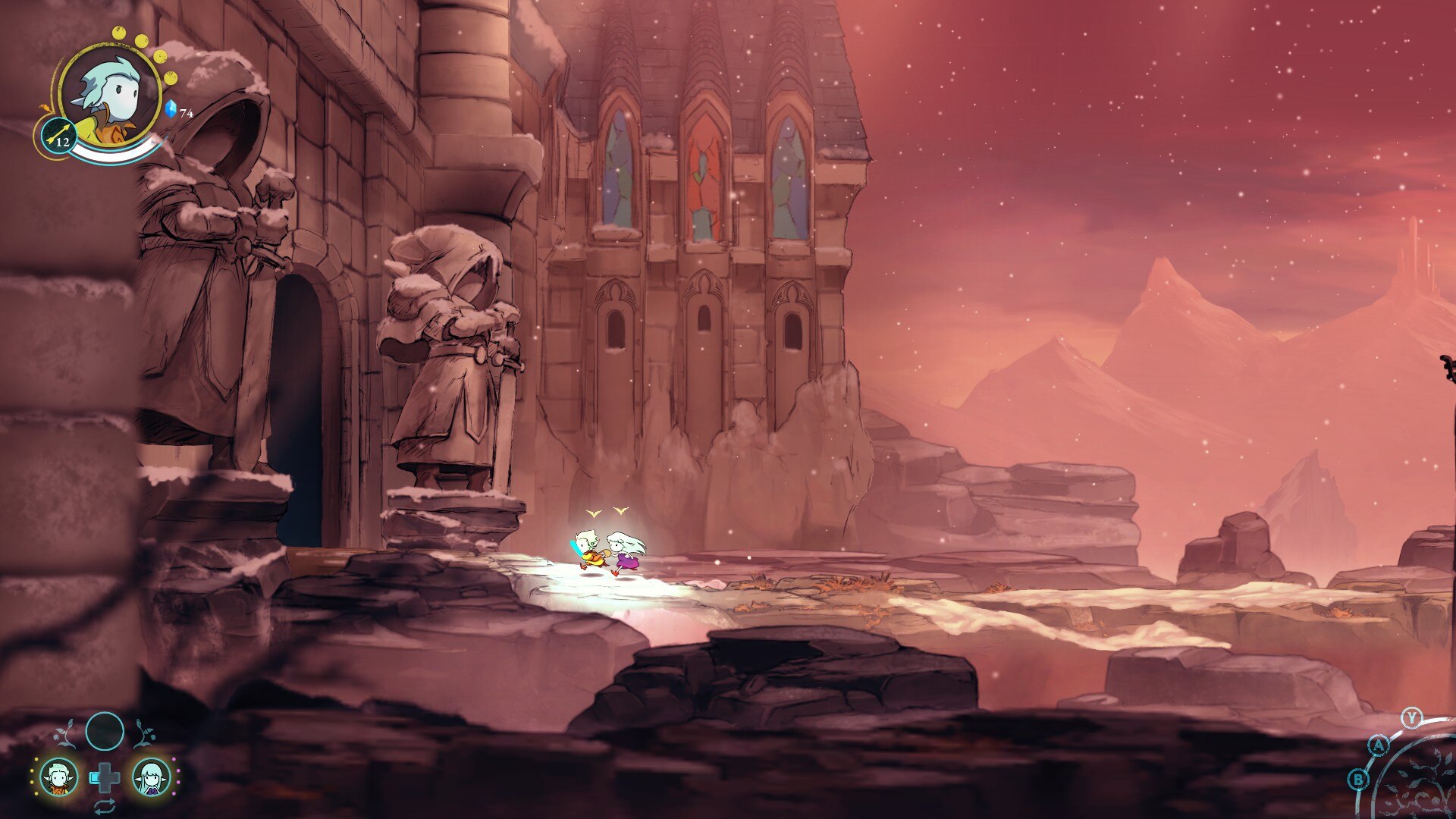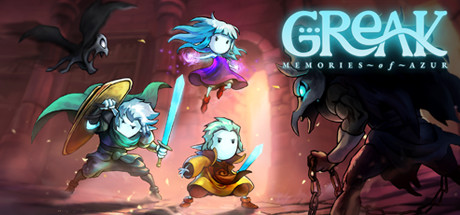Greak: Memories of Azur’s controls can be challenging to learn, mostly because of its unique mechanics, but you’ll appreciate the game even more once you get it covered.
Type: Single-player
Genre: Action/Puzzle Platformer
Developer: Navegante Entertainment
Publisher: Team17
Release date: 17 Aug, 2021


Intro
Greak: Memories of Azur is an atmospheric 2D platformer where you can control up to 3 characters at once. Areas will be filled with enemies and puzzles that utilize this mechanic, whether it’s for their number or unique abilities.
Visuals
Greak: Memories of Azur has a lot of atmospheric visuals. You’ll be treated with beautiful, hand-drawn backgrounds with a lot of layers and details. The soothing, subtle lighting also helps to make the game looks aesthetically pleasing, especially when combined with the detailed landscapes.
Story
I found the story to be very basic. There isn’t much depth to it and although it offers additional lore in the form of books for you to read, there isn’t much that can be learned from these books either, and most of them talk about some characters in the game world that don’t seem to have any use in understanding the worldbuilding. The only thing that I liked from the dialogues is how you’ll get different dialogues based on the character that you use.
The Game
Gameplay
Greak: Memories of Azur starts with one character to familiarize yourself with the basic mechanic. There are some weirdnesses in the control scheme like how you have to press a button to climb a vine or stairs instead of using the up button and the long animation delay before you can do another action, but you won’t sweat much about it later on, since there’s something more important that will hinder your gameplay.
The core mechanic doesn’t make sense at the beginning. First of all, controlling more than one character is a pain since one character has a different jumping mechanic – instead of doing a double jump, she’ll float, causing her to land in a completely different direction than the other two. This makes it hard to control all characters at once, especially if you have to jump over small platforms or jump between areas with spikes in them. The solution? Going over the section one by one. I had to do this most of the time at first since I wasn’t good at it, which feels weird since I had to redo the same section twice.

Your inactive character will still get hit by enemies, and you’ll get a game over if one of your characters dies. I can’t count how many times I died at the beginning simply because I left a character in an area where monsters spawn while moving the other character to traverse the area. Sometimes it’s hard to notice when an inactive character is getting hit, especially if you are focused on one character. Moreover, this becomes unavoidable if all of your characters are in an area with a lot of enemies. Inactive characters might attack without you controlling them sometimes, but I found them to be unreliable.
You can only use potions to the character that you are in control of. This makes it hard to heal your characters, especially if you are in a boss battle with 2 characters that need healing. You have to pay attention to the boss and avoid their damage at the same time, after all. There’s no way out of it except to tough it out and run, hoping that your character won’t die by the time that you’re far enough from the boss to heal.
Puzzle
Greak: Memories of Azur excels in its puzzle mechanics. Each dungeon will require cooperation between all characters, forcing you to switch between them to reach new places. My personal favorite is the final dungeon, simply because it’s more focused on puzzles, forcing you to utilize the characters’ ability to clear it. I found that some puzzles to be annoying though. There is this one puzzle where I had to jump over ice blocks with a torch that can melt the blocks below you, and I had to spend minutes to get past it.

Combat
Enemies scale as you progress the game. Greak, the first playable character, can solo most enemies himself without getting any damage at the beginning, although the same can’t be done as you get more characters to control. You’ll bound to get one or two damage before defeating them and dodging their attacks can be hard since they are hard to predict. This encourages you to bring all characters to battle, allowing you to stunlock enemies until they die. However, you’ll have to deal with the annoying control if you do that, especially after you get the last character since he can’t move while attacking, despite having higher damage.
Bosses are tough but fair. Some of them can prove to be challenging, especially when you have to control more than one character at once, but they are adjusted to cater to that. Bosses have simple and slow-paced attack patterns, save for one boss that I have no idea how to beat without going solo. You still need to take several tries to defeat them even if you have learned their attack pattern though. The most problematic part about defeating these enemies is in controlling the characters at once, but some bosses allow you to go solo if you enter the boss room with one character.

Length and Difficulty
The game is very short. It only lasts for 8.4h in my first playthrough, which can be made shorter if you try to avoid all enemies in your way. I replayed the game two more times, and the last one, the one that I did for a speedrun achievement, took ~2h without any effort.
The difficulty in this game lies in mastering its controls. You’ll spend a lot of time wondering why it works that way, especially regarding the inactive party member that still gets hit, but it becomes more bearable once you got it covered. If you still have a hard time beating the enemies, the game has a cooking feature that lets you cook items and potions from foraging items in the wild, and they are very generous with it.
Problems
The game doesn’t detect my controller if I reopened it several times and it becomes unresponsive if I exited the game with Alt+F4. Rotating levers also can be annoying with D-pad since you need to press the up, left, down, right buttons several times.
Specs
Intel Core i5-9300H 2.40GHz, 8GB RAM, NVIDIA GeForce GTX 1650
Verdict
Greak: Memories of Azur is one of the good games that I have played in a while. It has such an atmospheric experience that draws you in, whether it’s from the beautiful backgrounds or the soothing music. It can take some time to get used to the mechanics, and yes, I still found them to be weird and clunky at times, but it makes me appreciate the game even more after I get the gist of it. It’s not a game for people who wants to learn new mechanics though, since the learning curve is quite high – it takes time to get used to it.
Despite its combat problems, puzzles are where the game shines best. I wished that they focus more on this than combat, just like how it’s done in the final dungeon. I’m not sure whether the game’s length is alright at this point though – it ends way too soon after I get content with the controls and the last boss is not really memorable. Nevertheless, it’s still an enjoyable experience, and playing it several times to 100% it doesn’t bore me out in the slightest. I even enjoyed it more on my second playthrough since the control doesn’t become alien to me anymore. I definitely can recommend this game if you are up for something new due to the difficulty in mastering the control.










